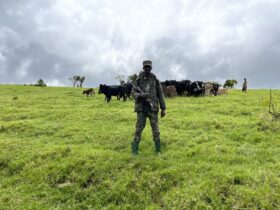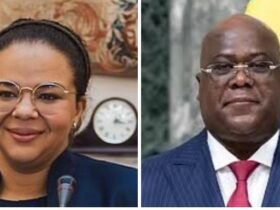 In a previous column on this blog I indicated that the Rwandan political system as enshrined in the constitution is no ‘Zero-Sum Game’, but an inclusive, power-sharing arrangement, based on the ‘Constant quest for Solutions through dialogue and consensus’.
In a previous column on this blog I indicated that the Rwandan political system as enshrined in the constitution is no ‘Zero-Sum Game’, but an inclusive, power-sharing arrangement, based on the ‘Constant quest for Solutions through dialogue and consensus’.
It is against that backdrop, that I dare suggest that, in light of in-coming electoral results, the Democratic Green Party (DGP) and PS-Imberakuri have finally won their place in the up-coming Rwandan Parliament and/or government.
But first things first: Congratulations to the Rwandan Patriotic Front (RPF) for a solid win, and to all Parties involved for observing restrain and upholding democracy. Indeed we have had peaceful electoral campaigns across the country, and most importantly, we have not heard any party leader prematurely declare victory before the official announcement by the electoral commission. This behavior gives us confidence that the aftermath of a potentially risky exercise elsewhere, will be peaceful and democratic in Rwanda, and this precisely due to the peculiar power-sharing arrangement introduced above.
By printing time, the National Electoral Commission had only announced 70% of the results. This analysis is therefore based on a steady trend observed in the provisional results of the September 3rd 2018 parliamentary elections, and it is only limited to five political parties and their coalition; namely
| Political Party | Provisional Results | Minimum required |
| The RPF-Inkotayi and Coalition | 75 % | 5% |
| The Social-Democratic Party (PSD) | 8.5 % | 5% |
| The Liberal Party (PL) | 7.6 % | 5% |
| The DGP | 4.6 % | 5% |
| The Social Party (PS-Imberakuri) | 4.3 % | 5% |
Five Percent Threshold (Art. 107-108, Electoral Code): ‘For an independent candidate to secure ONE seat; and a Political party to be represented in the Chamber of Deputies, they are required to have obtained at least 5% of the votes cast respectively.’
As unfair as this provision sounds for independent candidates, it is not about to change, given the poor performance of the traditional ‘political runners-up’. Indeed for PSD and PL both clearly losing momentum, to vote for lowering the five percent threshold would be akin to embracing political self-obsolescence.
Yet, that should not stop the ‘Greens’ to enter parliament and Imberakuri to enter government, in extremis. My argument is based, not on a mere mathematical calculations of the law, but on its spirit, object and purpose.
Why was the ‘Five percent’ threshold enacted?
- To ensure that no freelance adventurers enter Rwandan parliament;
- To ensure that every ‘sizeable’ constituency is represented in the Rwandan legislature
What’s important isn’t the figure (5) per see, but the ‘representability’ of the electorate and the ‘legitimacy’ of the candidate; in an open and democratic society, based on human dignity, equality and freedom.
It is my humble opinion that the two parties that scored above 4% meet both measurements.
Let’s take two countries with similar ‘list’ systems for instance; the threshold to be eligible for the Argentinian ‘Congreso de la Nación’ is set at (3%). The Israel’s ‘Knesset law’ breaks it down to the centesimal fraction of (3.25%).
In as far as the Rwandan electoral law is silent on decimal or centesimal points of the threshold, one may argue that 4.6 can be rounded up to 5%; especially when such score represents more than half of the second best electoral performance in the country.
Moreover, a merger of Imberakuri and DGP’s electoral tally represents 8.7%. This is as significant as the PSD and PL scores respectively. And such a constituency may not be disenfranchised.
Matters of law, politics, governance and all pertaining to social sciences are not to be viewed with empirical, mathematical lenses. Even there, it is not clear whether the value of ‘Pi’ (π = 22/7) should be rounded up to (π = 3.14) or must it be kept as (π = 3.14159), or rather, as recently adjusted to: (π = 3.142857)?
The 5% is only a finger pointing at the moon; the big picture, which is: political inclusivity, legitimacy, representability, etc.
That said, this article should not be seen to advocate for the appointment of a particular individual to a particular position. It simply aims to interpret the interesting messages that were communicated by citizens in the just concluded elections.
So let me end with a few observations:
Whatever will happen, all registered political parties are already represented in policy-making as members of the Forum of Political Organisations (Article 59: of the Constitution);
The turnout was low for the legislative elections. This either means that citizens aren’t ‘overwhelmed’ by their MPs or that they saw no salience or controversy in the final outcome;
The low turnout may also be caused by political apathy, typically observed in countries that have been stable for a long time and where change isn’t much desired: ‘As long as things remain the same; all is well?’
I couldn’t end without giving a shootout to Ms Christine Mukabunani for reaching 4%; One percent shy of clinching the parliament. Maybe next time…
Update: This prophesy was fulfilled by the Electoral commission. Green Party and PS-Imberakuri are going to parliament, with two seats each.















Leave a Reply